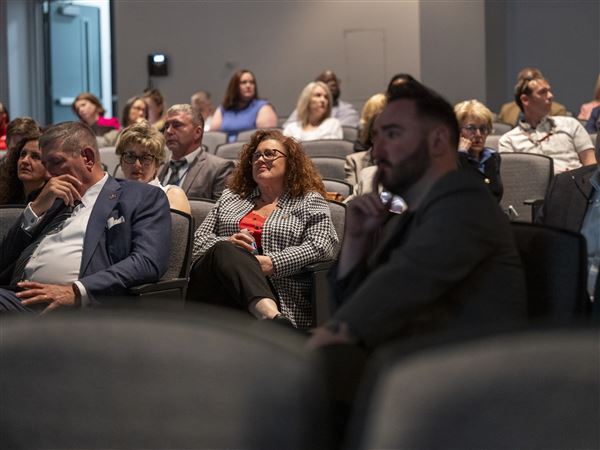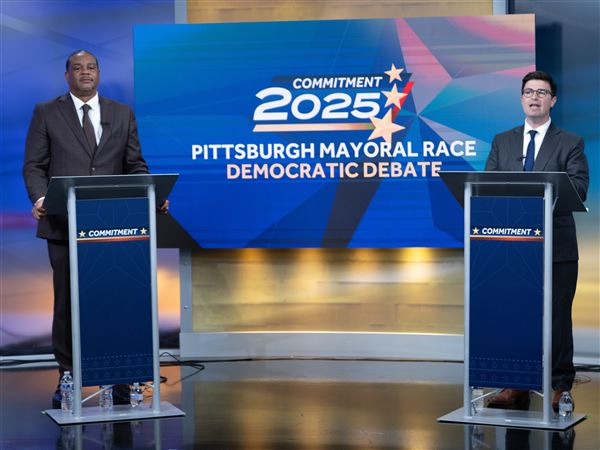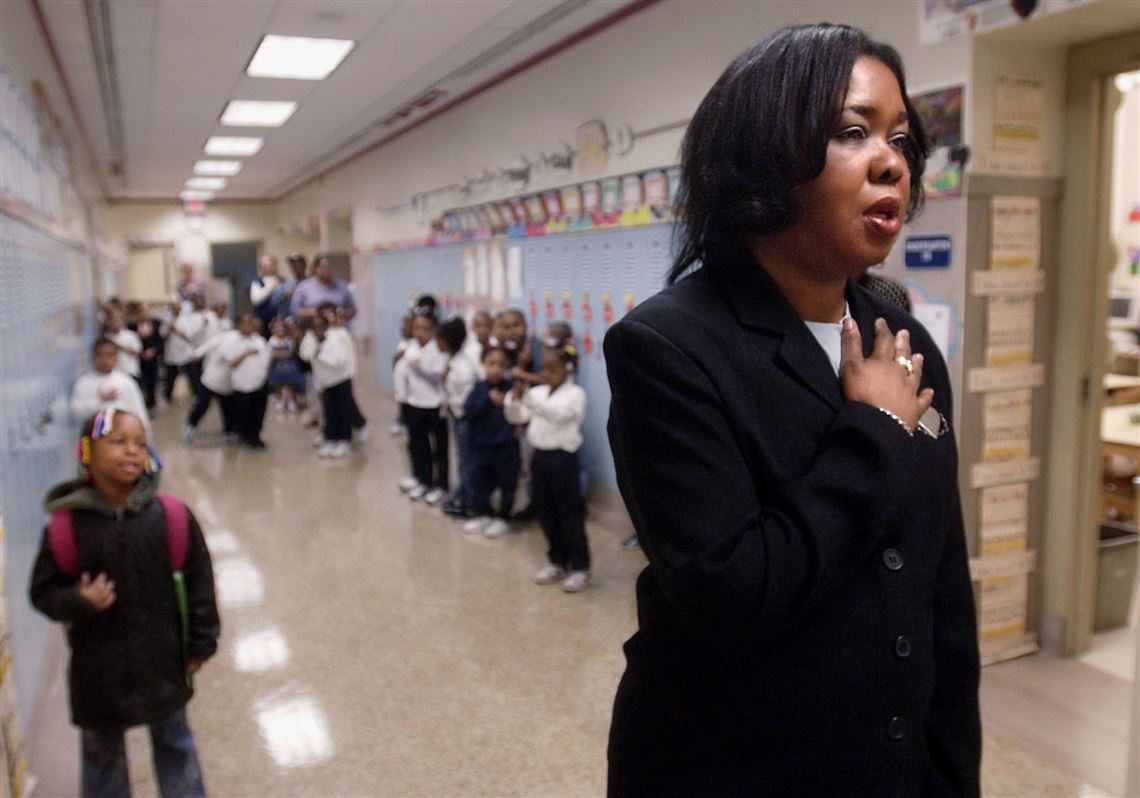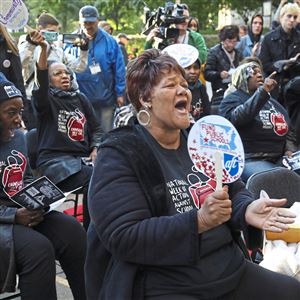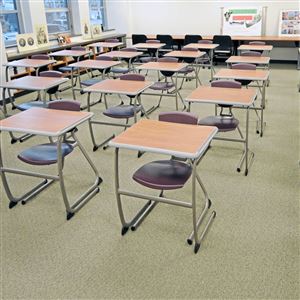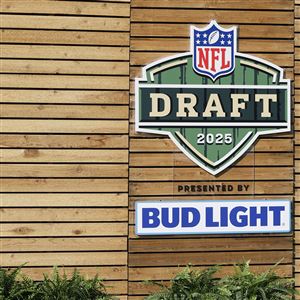In the aftermath of February’s fatal mass school shooting in Parkland, Fla., hundreds of school districts across the country have been debating for the last several months about whether armed police officers are the best way to protect students from would-be attackers.
But the question was posed quietly to the Pittsburgh school board back in early 2016, when the Pittsburgh Federation of Teachers, which also represents the district’s 22 police officers, asked the board to consider allowing them to carry guns. They sworn officers have the power to file criminal charges but don’t carry weapons of any kind.
And almost three years later, the school board finally intends to give the officers an answer when it votes on Oct. 24. That answer very likely will be ‘no.’
“I don't think that this should have ever been brought forward,” said board member Moira Kaleida during a workshop session last week. “I do not believe in arming school police, and I believe in protecting each and every student in Pittsburgh Public Schools and arming officers are not the way to do that.”
“Right now in Pittsburgh Public, there is zero percent chance of a school police officer shooting a child,” she said later. “That changes the minute this policy changes. I’m never going to vote to put a child in harm’s way.”
Ms. Kaleida was one of six school board members who said that they intend to vote against changing the current policy, which prohibits the school police from carrying weapons of any kind. In July, seven of the nine board members voted in favor of a resolution calling for “sensible” gun legislation and opposing any effort to arm teachers or support staff in schools. Board members Terry Kennedy and Cynthia Falls abstained from that vote.
The district’s security department employs 92 people, including the 22 officers and dozens of security guards, who would not qualify to carry guns.
Board President Regina Holley, who was chair of the safety committee when the request first came before the board, said she intends to vote against arming the school police.
“I want to be really clear, I am not voting to arm school police,” said Ms. Holley, a former principal in the district. “There are enough people out there with a gun. I don't need to have the school police coming in with a gun, as well. Our city police know what to do, I put my trust in them. Sometimes they make me mad, but I know one thing, when I need to call them they are there.”
Ms. Falls, who was absent for the policy workshop, expressed her support for the policy change in an email to the board. Ms. Falls was traveling and could not be reached for comment. Board member Sylvia Wilson said she was saving the majority of her comments for the voting meeting.
Those members who said they don’t support a policy change during the debate cited concerns about student safety at the hands of armed police and said Pittsburgh city police officers, who are called in emergencies, always respond quickly.
“I just think the chance of human error and implicit bias toward some of our students just increases the likelihood of people getting killed,” said board member Lynda Wrenn.
Even though the proposal seems doomed to fail, Ms. Kennedy said she wanted to make sure the board at least had a public discussion about the issue since it came at the request of the school police and the teacher’s union.
When Ms. Kennedy assumed the chairmanship in late 2016, she said she felt the board was bound to at least consider and research the matter as it would any other request from district employees. Ms. Kennedy also questioned whether the district would have any “legal exposure” if an incident like a school shooting occurred and it was discovered that the board “swept it under the rug” and didn’t even have a public discussion about the request.
“I think we have to look down at what it is from their point of view,” Ms. Kennedy said about the school police. “They're putting their lives potentially on the line if an incident happens. We don't know if an incident will happen. My hope is that we never have an incident where they would ever need to use the guns.”
Board member Kevin Carter also opposes arming officers, but said it was an important topic to be aired.
"This is a very, very important discussion that I thought we weren't going to have because I didn't think that we would ever consider to even make this policy change as a board," Mr. Carter said at the workshop session, adding that he does not think it is the most "effective practice" to ensure student safety.
Board member Sala Udin reminded the audience that the discussion about the policy change was just part of the democratic debate process, not an indication that the board wants to arm the school police.
“That is not what is happening here,” he said. “It is a matter or democratic debate on issues both pro and con, and we’ll be taking a vote soon and this item will be back off the table as it has been for the last 10 years.”
PPS police Chief George Brown declined to be interviewed for this article, though he outlined his position for the board during the workshop.
“I want to stop whatever's coming outside inside,” he told the board.
Although he said his officers have never confiscated a firearm inside a PPS school, Chief Brown cited instances where officers have discovered weapons on school property and building lockdowns as city police investigate crimes in the surrounding neighborhoods.
“I want those bad guys to stay three or four blocks up the street and not come into my schools,” the chief said. “But what if they do?”
He also said his unarmed officers could be a “liability” for city police, who would need to protect them as well as students and faculty in a school shooting scenario. Pittsburgh city officers can’t respond to a situation as quickly as the on-site school officer, Chief Brown said, although that point was debated by several school board members.
Several Pittsburgh city police officers were in the audience during the debate, although Pittsburgh police spokesman Chris Togneri said the bureau had no comment on the topic. Allegheny County District Attorney Stephen A. Zappala, through his spokesman Mike Manko, said the move to arm school police is up to the school board, although he generally has no objection to armed police officers in schools if they are properly trained.
But Robert Swartzwelder, president of the Fraternal Order of Police Local 1, which represents Pittsburgh city officers, said it “makes zero sense” not to arm a police officer if that officer is properly trained.
“You're placing them in a position to keep the employees and the children safe inside these schools but you’re not giving them the tool to do so,” he said. “If you're not going to give them the proper tools and training and authority to do their job appropriately, then why have them?”
His response was echoed by PFT President Nina Esposito-Visgitis, who said the union will discuss next steps the officers and the rest of its membership after the school board votes later this month.
“It's very important to us that our members have the tools that they need, whether they're teachers, paraprofessionals or our police officers,” she said. “I'm sure this will be a continuing discussion.”
Elizabeth Behrman: Lbehrman@post-gazette.com, 412-263-1590 or @Ebehrman on Twitter.
First Published: October 5, 2018, 5:49 p.m.

